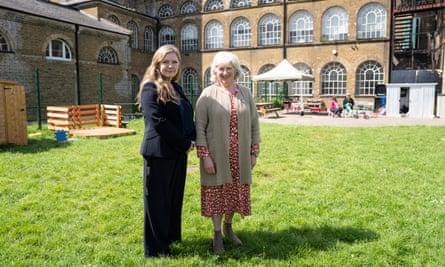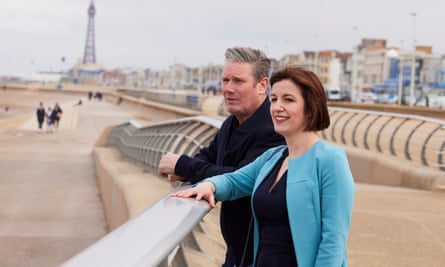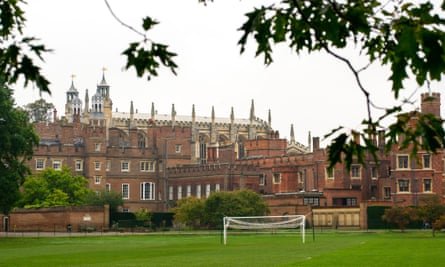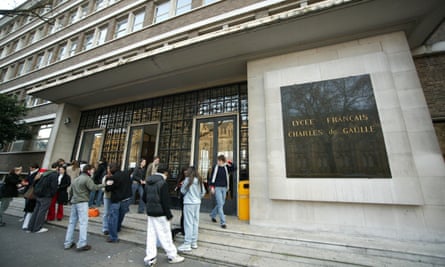[ad_1]
Parents and children say they love the London Welsh school, the only bilingual Welsh language nursery and primary school in England. The only problem, according to the school’s chair of governors, is there aren’t enough of them.
For 65 years Ysgol Gymraeg Llundain has been teaching Welsh language and culture to children of the Welsh diaspora. But since Covid, the tiny independent school in west London has become even tinier.
The school began last year with 25 pupils, until the end of pandemic measures resulted in many of its families moving back to Wales. This year the London Welsh school has just eight pupils.
“The problem we’ve got now is the younger children haven’t joined. And Covid had a part to play in that, because before lockdown families would make an effort to travel further and come to us. But because we were all told to stay local, of course children went to a local nursery and they then progressed to a local school,” said Glenys Roberts, the chair of governors who has been involved with the school for 30 years as a parent and former teacher.

“It’s not easy with such small numbers but the school is a happy place and full of love. We need some more children but we will carry on.”
While wealthy and elite schools such as Eton and St Paul’s girls school come to mind when people think of fee-paying schools, a larger number of independent schools in England are like the London Welsh school – small, precarious and catering to a niche that state schools can’t provide for.
Eton and Ysgol Gymraeg Llundain may soon have something in common: a future Labour government aims to apply VAT of 20% to the fees they charge pupils. Labour says adding VAT will raise about £1.6bn a year, with the shadow education secretary, Bridget Phillipson, pledging to use the funds to recruit more staff in vital subjects such as maths and physics.
“Excellence must be for everyone – that is why the next Labour government will invest in more teachers to fill these gaps and provide expertise, paid for by ending tax breaks for private schools,” Phillipson told school leaders in April.
The prospect of higher school fees has led to warnings of a sudden exodus of pupils from the private sector, with the extra cost to the government eating into the £1.6bn windfall.

Jeremy Hunt, the chancellor, used last year’s autumn statement to attack Labour’s policy, citing predictions that it would “result in up to 90,000 children from the independent sector switching to state schools”.
A survey of parents by the Independent Schools Council (ISC) found 20% said they would “definitely” withdraw their children from private school if VAT was added, costing the government about £600m a year in additional spending on state schools. But economists who specialise in education said they were highly sceptical that adding VAT would spark an immediate exodus.
“I think the suggestion that there’s some sort of mass rush as soon as the policy comes in is incredibly unlikely. It’s not impossible, but it’s incredibly unlikely,” said Luke Sibieta, a senior research fellow at the Institute for Fiscal Studies.
One reason, according to Sibieta, is that the willingness of parents to pay for private education is not directly related to its price. In economic jargon, demand for private schooling is “inelastic”, meaning that price increases do not lead to falls in pupil numbers by the same amount, if at all.
“The only honest answer we can really give is that we don’t know what the effect will be. I think surveying parents is not really the best way to find out, because any parent who is asked ‘do you want to pay 20% more for your child’s education?’ is going to say no,” Sibieta said.
“That’s not to say that if you put 20% VAT on fees there wouldn’t be an effect on demand, because there probably would be. But demand for private schooling is often shaped by things like culture, aspirations, whether you went to a private school as a child, so it’s the kind of thing that we probably think of as being quite inelastic.
“But the truth is, we don’t really know what’s going to happen until it actually happens.”
Economists said the impact of adding VAT depends on several interlocking factors, including how much of the increase is passed on to parents, as well as their income and ability to afford the higher fees, and their unwillingness to disrupt their children’s education by abruptly changing schools.

Dr Jake Anders, an economist and deputy director of UCL’s Centre for Education Policy and Equalising Opportunities, said: “The VAT rules are not that you have to take what your price is today and hike it by 20%. The schools decide what changes in price they are going to make in response, and that will be informed by their costs and their ability to trim those costs in order to keep the price from rising, as well as their knowledge of what is likely to happen to demand in response to fees rising.”
Adding VAT to fees would allow private schools to offset costs by reclaiming VAT on their spending, which would knock several percentage points off any increase. Anders said private schools could also copy what state schools have done when faced with shrinking budgets: allow class sizes to rise, cut back on overheads, sell off assets and appeal for donations.
Anders said his “gut feeling” is that there wouldn’t be a mass exodus of pupils. “Basically, it seems unlikely to me. Apart from anything else, it seems unlikely that private schools would just stand by and watch pupils leave and not do something about their price. Ultimately, they set the price.”
Sibieta said many parents who could afford current fees of £15,000 to £20,000 a year were likely to be able to afford further increases, based on past behaviour. “What we do know is that fees have been going up inexorably for the last 20 years, you see the 5% increase in fees annually, on average, over the last 20 years. And still the share of pupils in private schools has not changed almost at all over time.”
But while some well-established private schools have the resources to cope, including millions of pounds in endowments, investments and property, as well as profits from overseas branches in Asia and elsewhere, others such as the London Welsh school will struggle to cope with VAT being added to fees.

The fees at the school are just over £4,000 a year – below the average per pupil funding at state schools and far lower than the £20,000 day school fees charged by ISC member schools in London. While some ISC members boast heritage buildings, science blocks and leafy playing fields, the London Welsh school holds its classes at the Hanwell community centre in Ealing.
“The ethos of the school is not really ‘private school’. We are an independent school, we have to ask for fees, because we’ve got to run the school and we can’t run it on fresh air, unfortunately,” said Roberts, the London Welsh chair of governors.
The school already keeps its fees low through donations from Welsh supporters and volunteering by parents. The Welsh government also gives an annual grant to promote the Welsh language, without which Roberts says the school would be in “dire straits”.
“Our fees are modest and we keep them modest because of the nature of our families. So finding even our fees might be a challenge for some of our families. But yes, I feel a hike of 20% would make a difference. Whether it would put people off, it’s possible, but it would have an effect on our families,” Roberts said.
The school’s fans include Ofsted, which describes it as an extended family and praises its teaching for pupils learning to read “with equal confidence and fluency” in both English and Welsh. Angela Kay, whose son is a pupil at London Welsh, described it as “amazing” but lamented: “It’s a shame people don’t know it exists.”
The Department for Education lists 2,394 independent schools registered in England. Of those, about 260 are members of the elite Heads’ Conference or HMC, representing the best known private schools including Westminster and Eton. HMC schools are also part of the Independent Schools Council, whose 1,343 members in England charge nearly £17,000 a year for day pupils and educate the bulk of the more than 580,000 children attending private schools.
The ISC also includes a substantial number of privately owned schools, with more than 350 run by for-profit companies. Traditional family-owned private schools have been disappearing for decades, with recent years seeing overseas investors buying up private schools.
The London Welsh school is one of the more than 1,000 independent schools that mostly sit outside the ISC and which in many cases are nothing like their nominal peers. About 600 are special needs schools that Labour says it will exempt from VAT, while the rest range from the French government-backed Lycée Français Charles de Gaulle to others offering alternative pedagogies such as Montessori schools.

Many others are faith schools, mostly small Islamic, Jewish or Christian schools. They tend to be based in borrowed spaces within mosques, community halls or houses, with fees well below those of wealthier nearby private schools.
Emmanuel Christian school on the outskirts of Oxford is an interdenominational nursery and primary school with just 55 pupils. Lizzy Nesbitt, the school’s headteacher, says its small size gives her the freedom to be innovative and “not feel bound to just follow what everybody deems to work, but to think quite creatively and thoughtfully and deeply” about how children learn as individuals.
“We really want children to understand how amazing and vast and exciting the world is. Underpinned by that is a Christian view that this is a world made for them by God the father, and he wants them to understand it and enjoy it, and appreciate it in its diversity and beauty and wonder. That then gets worked into our curriculum so that we choose really interesting topics to do with them that lights them up,” Nesbitt said.
Emmanuel charges £6,500 a year, a third of the fees for junior pupils attending a nearby prep school. Nesbitt said the school’s ethos and community meant both staff and parents were prepared to make financial sacrifices.
“Part of what makes it very special is that all of us do not command the salaries that we would within the state sector. Nor do we have a teacher’s pension that we would have in the state sector,” Nesbitt said
“Whenever we send out the fee increase letter once a year, I always say to parents that this school is built by love and everybody gives in love. The staff give in love to make it more affordable, so that’s a sacrifice that staff make. Many of our parents are making sacrifices, because they’re not from high income families. We have very few families who are earning six figures, I think probably 10%. So many families are making sacrifices to send their children here.”
Nesbitt said that while she was confident that the school would “prevail, regardless of government policy” if VAT was added to fees, she felt sad that the state would be in effect taxing the goodwill of both staff and parents.
“I regularly have parents visit the school who say my child is doing OK [in a state school] but they don’t feel known, they’re getting lost,” Nesbitt said.
“When these children come to us, we’re taking an obligation off the state to educate that child and the parents are taking on the cost of that child’s education from the state, often at great sacrifice, so their child feels better known and their needs might be more fully met. And it feels to me cynical to tax that parent, who is acting in love for the good of their child.”
[ad_2]
Source link
Meet Our Successful Graduates: Learn how our courses have propelled graduates into rewarding
careers. Explore their success stories here!
Discover More About Your Future: Interested in advancing your teaching career? Explore our
IPGCE, MA, and QTS courses today!

